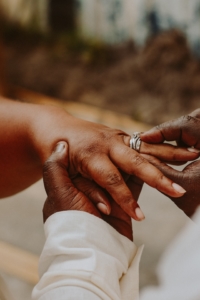So you’re engaged; now what? Planning and preparing for your marriage (not just your wedding!) is the next step. Although you might find yourself caught up in the excitement and stress of getting ready for your big day, it’s important not to neglect the relational preparation you need to work through with your future spouse.
It’s vital to talk about the beliefs, expectations, and realities that will have an impact on your marriage long after the wedding is over.
 Engagement is a time of joy and anticipation, but it can also bring out stress and conflict as plans get underway. So much energy can go into details related to the wedding that a pattern of neglect can form with regard to the relationship itself.
Engagement is a time of joy and anticipation, but it can also bring out stress and conflict as plans get underway. So much energy can go into details related to the wedding that a pattern of neglect can form with regard to the relationship itself.
Premarital counseling is a good way to maintain intimacy throughout your engagement. It can help strengthen your relationship and facilitate constructive conversations and intentional preparation for the future.
Pre-Marriage Counseling Topics to Increase Intimacy
Discussing specific marriage-related topics can help you as a couple navigate the transition into marriage in a healthy way. Here are four examples:
1. Communication
Couples who struggle with communication may fear to seek counseling because it might compel them to talk about painful topics. But counseling can be a safe place to work on having open communication between the two of you. It’s a neutral, confidential setting to explore subjects that need discussion, as well as how each of you naturally tends to communicate.
We all have an instinctive communication style we prefer, based on our personalities and the way our parents and family of origin related to one another. We might think that our own communication style is what’s normal for everyone, but it can be shocking to find out that our spouse essentially speaks a different language than we do, and that’s considered “normal” to them.
Because of this, spouses often misunderstand and misinterpret one another just because of their different ways of communicating. There is much room for growth in intentionally learning how your partner communicates and how to speak their language. You can talk about certain phrases you each tend to use and what you mean by them.
Couples often think that their spouse should be able to automatically understand what they’re thinking or feeling. After all, they know each other so well, right? But this just isn’t the case.
 We may develop an understanding of our spouse’s patterns over time, but no matter how long we are married, we will never be able to “just know” what another person is thinking or feeling unless they tell us explicitly. Otherwise, incorrect assumptions are inevitable.
We may develop an understanding of our spouse’s patterns over time, but no matter how long we are married, we will never be able to “just know” what another person is thinking or feeling unless they tell us explicitly. Otherwise, incorrect assumptions are inevitable.
When you don’t feel understood by your spouse, you’re much more likely to have communication problems or hurt feelings. As time goes by in your marriage, you’ll grow to understand each other better, but even then be sure to give each other grace for not being mind-readers.
The potential for hurt is actually greater when you feel as though your partner should understand you because of how long you’ve been married or how close you are to each other.
So engagement is the perfect time to start laying a foundation for healthy communication. Learn how to communicate your thoughts and emotions clearly and respectfully. Create habits of open communication, letting your partner know what’s going on with you, without assuming that they already understand.
Creating these communication patterns early on in your relationship gives you practice in handling conflict in a way that is mutually beneficial. Encourage each other and alert yourselves to potential communication breakdowns, especially those based on possibly false assumptions about the other person. Patterns of communication formed over a lifetime are difficult to break, so now is the time to adjust your habits of interaction.
2. Sexuality
In Christian environments, it may seem taboo to mention sexuality, but it’s vital to cover in premarital counseling. Sexuality is about more than the act itself; it’s a powerful instrument of connection between married couples, allowing physical and emotional intimacy to flourish.
Engaged couples often feel that they can skim over the topic of sexuality and that their sexual relationship within marriage will be effortlessly good, but this isn’t always the case.
Each future spouse has expectations, concerns, and questions related to marital intimacy, and premarital counseling is one of the best places to discuss these things. You can reflect on where your assumptions about sex developed (family, friends, education, etc.) and what expectations you’re bringing in to your marriage.
It’s important to discuss how you will cultivate your sexual relationship within marriage, along with any concerns or curiosities you may be bringing into it. Depending on your comfort level, set some intentional time aside to discuss physical intimacy and how it will progress after your wedding day.
Don’t forget to discuss the practical matters too. What about birth control? How will this affect your relationship and any future plans to have children? Also, consider privacy and how it will be to live together if you have not already cohabitated. It can be quite an adjustment going from having your own space, even with your family of origin or a roommate, to sharing everything with a spouse.
As a couple, what can you talk about now that will make these adjustments easier? How much privacy do you each prefer? Contrary to expectations for a perfect Hollywood-esque relationship, real marriage can be hard, and busy schedules can make it difficult to carve out time for a spontaneous, exciting love life. Although it may seem less romantic, it’s often important to be very intentional in setting aside time for physical intimacy.
3. Inner World
This is an opportunity to discuss your desire for your spouse to know and understand you deeply. Although you probably have this desire, it can also be frightening to be known this closely. In order to be close and increase intimacy, vulnerability is required. You have to let your spouse in.
 A way to start doing this to explore each other’s inner world. This means getting to know your partner’s hopes, dreams, likes, dislikes, fears, and anything related to their preferences and desires.
A way to start doing this to explore each other’s inner world. This means getting to know your partner’s hopes, dreams, likes, dislikes, fears, and anything related to their preferences and desires.
Drs. John and Julie Gottman have described this process as creating “love maps.” Dr. John Gottman’s research has indicated that couples whose love maps are detailed tend to have stronger and more intimate relationships than those with less developed love maps.
This process of getting to know one another’s inner worlds is an ongoing activity that should characterize your marriage over the course of your lives. In the same way that a city changes over time, with new construction and expansions, our inner worlds do the same.
It takes work to get to know your spouse’s deepest desires, dreams, and fears, and when you do this, you’re creating your “love map” of their inner world. Love maps increase intimacy, because not only are you getting to know your spouse better, you’re investing time and value into the process.
Intentionally seeking greater intimate knowledge of your spouse should be at times that are relaxed, when both partners feel safe and comfortable (i.e., not during a conflict) and able to absorb what the other person is sharing. It’s a good addition to a date night. You can make it more structured by taking turns asking each other questions and discussing memories, struggles, joys, hopes, fears, and dreams.
Inner worlds are complex, layered, and only reveal themselves with time and effort. Life changes shape the details of our inner worlds. In The Seven Principles for Making Marriage Work, Dr. Gottman says, “If you don’t start off with a deep knowledge of each other, it’s easy for your marriage to lose its way when your lives shift so suddenly and dramatically.”
For this reason, it’s best to create the habit of getting to know each other’s inner worlds early on in your relationship. Then you will have the tools to learn new things about your spouse throughout your marriage, which you can add to your “love map” of them.
4. Conflict Management
For some people, talking about conflict might seem counterintuitive. Oftentimes couples have the idea that the less conflict, the better; if they just got rid of conflict altogether, they would have a much better relationship.
But this isn’t the case. Conflict isn’t a bad thing that should be avoided at all costs. Instead, it’s an inevitable aspect of every human relationship, and handling it in a healthy way offers a key opportunity for genuine intimacy.
 Conflict is unavoidable at some level, but the way you achieve intimacy through conflict lies in how you deal with it. Equipping yourselves with healthy conflict management skills gives you a chance to resolve issues without hurting each other emotionally. This way you can learn to understand your spouse in a deeper way, without leaving scars from hurtful conflict.
Conflict is unavoidable at some level, but the way you achieve intimacy through conflict lies in how you deal with it. Equipping yourselves with healthy conflict management skills gives you a chance to resolve issues without hurting each other emotionally. This way you can learn to understand your spouse in a deeper way, without leaving scars from hurtful conflict.
If there is a topic you know is likely to cause conflict, learning how to approach it without being on the defensive is an invaluable skill. Conflict does not have to turn into an ugly argument or be avoided altogether; instead, it can be resolved in a healthy way, and this knowledge can make each partner in the relationship feel more hopeful and confident when approaching difficult topics.
A willingness to examine current conflict patterns in your relationship is a helpful first step. You can identify any patterns that are destructive and that serve to escalate disagreements rather than settling them.
Once you’ve identified these patterns, you both can work on changing them to more constructive ways of dealing with the situation, allowing you to resolve disagreements in a way that allows for growth and intimacy.
A Christian Pre-Marriage Counseling Perspective
A Christian counselor can help facilitate these conversations, leading to the best outcome for both of you as you work toward greater intimacy. Depending on which topics you’re discussing, a counselor may give you extra materials, education, or practical exercises to work on the strengths and weaknesses of your relationship.
Every relationship has both strong points and areas where growth is needed, and addressing these points early on will allow you to build a strong foundation of intimacy.
One of the main objectives of premarital counseling is for the counselor to help you discover the preconceived notions and expectations you each bring to the intended marriage. This is a way for couples to get to know one another and possibly grow closer than they have been before.
Vulnerability opens the door to intimacy, allowing a beautiful chance for growth and flourishing. God’s desire is for married couples to experience oneness and openness through being intimate with one another.
This sacred unity develops over a lifetime, as both learn to submit to one another and to Christ. He uses this journey to transform us to be more like Him, which is part of His intended purpose in creating marriage.
Please remember that no couple is going to master and flawlessly implement perfect communication skills, love maps, or conflict resolution, especially before the wedding has even taken place.
Premarital counseling is simply a place to begin, and to give you knowledge and tools to help you with the transition into marriage. It allows you to be more aware of patterns in your relationship and the tools you’ll need for growth both now and in the future.
But growth always takes time, and it’s very normal for a marriage to take at least a year to settle into a comfortable harmony and flow. Marriage is a constantly-changing, ever-evolving journey of growing in intimacy, communication, and love.
The premarital counselor is simply a facilitator of discussions that will hopefully continue throughout your marriage as you resolve conflicts, get to know each other’s inner worlds and build a stronger relationship.
If you are engaged or planning to be soon, and you think premarital counseling could be beneficial for your relationship, let us know how we can work with you to prepare you for a godly marriage.
Photos
“Engaged”, Courtesy of Ben White, Unsplash.com; CC0 License; “Conversation”, courtesy of Christin Hume, Unsplash.com; CC0 License; “Hopes and Dreams”, Courtesy of Edward Cisneros, Unsplash.com; CC0 License; “Lightning”, Courtesy of Casey Horner, Unsplash.com; CC0 License
 Go for a boat ride
Go for a boat ride
 One of the leading causes of arguments among married couples is finances. That may not sound very romantic to talk about as you plan your wedding but it is important. If you want to minimize arguments, disagreements, and an area of strife that could lead to divorce, discussing financial questions in premarital counseling is essential.
One of the leading causes of arguments among married couples is finances. That may not sound very romantic to talk about as you plan your wedding but it is important. If you want to minimize arguments, disagreements, and an area of strife that could lead to divorce, discussing financial questions in premarital counseling is essential.
 Having gone through the dating ordeal and confirmed your intentions for one another, talking about premarital counseling seems like putting one last obstacle in your way just before the finish line. Do you need premarital counseling, or is it something for people who aren’t sure about what they want?
Having gone through the dating ordeal and confirmed your intentions for one another, talking about premarital counseling seems like putting one last obstacle in your way just before the finish line. Do you need premarital counseling, or is it something for people who aren’t sure about what they want?

 Sex is a huge part of the physical and emotional connection between a couple. Questions will have to be answered about each person’s expectations about sex. How frequently does one expect it? What are the boundaries you’re establishing about sexual intimacy? These and other questions must be asked to ensure that this aspect of their lives is also addressed.
Sex is a huge part of the physical and emotional connection between a couple. Questions will have to be answered about each person’s expectations about sex. How frequently does one expect it? What are the boundaries you’re establishing about sexual intimacy? These and other questions must be asked to ensure that this aspect of their lives is also addressed. It is better to have important and life-shaping conversations before you vow to spend your lives together. These conversations can help you discover any red flags or draw you closer to one another as you prepare to spend your lives together, for richer and poorer, in sickness and in health.
It is better to have important and life-shaping conversations before you vow to spend your lives together. These conversations can help you discover any red flags or draw you closer to one another as you prepare to spend your lives together, for richer and poorer, in sickness and in health. It is important to talk through commitment and what it means to each of you. Once you walk down the aisle and vow to spend your lives together, does that mean through thick and thin? Does that mean you vow to keep working even when you feel disconnected and distant from one another? What does that mean when one of you gets a job offer in a different place? Take time to talk through marriage commitment and why you were drawn to your significant other.
It is important to talk through commitment and what it means to each of you. Once you walk down the aisle and vow to spend your lives together, does that mean through thick and thin? Does that mean you vow to keep working even when you feel disconnected and distant from one another? What does that mean when one of you gets a job offer in a different place? Take time to talk through marriage commitment and why you were drawn to your significant other. Some couples wait until years into their marriage to talk about their hopes and dreams for a family. To avoid miscommunication in the future, it is helpful to just talk through what you pray for someday. Do you hope to have children? Are you wanting a big family or a small family?
Some couples wait until years into their marriage to talk about their hopes and dreams for a family. To avoid miscommunication in the future, it is helpful to just talk through what you pray for someday. Do you hope to have children? Are you wanting a big family or a small family?
 Adam and Eve had one another in this brave new world – someone who was an equal but different and complementary. Since people are made in God’s image, it makes sense that Adam and Eve had an innate desire for relationship and that it wouldn’t be good for either of them to be alone. As descendants of Adam and Eve, all of us are the result of this first marriage.
Adam and Eve had one another in this brave new world – someone who was an equal but different and complementary. Since people are made in God’s image, it makes sense that Adam and Eve had an innate desire for relationship and that it wouldn’t be good for either of them to be alone. As descendants of Adam and Eve, all of us are the result of this first marriage. Of all the things one could say about marriage, one apt description is that it is a mystery. It’s a mystery in a least two ways. First, despite our culture’s fractious relationship with marriage, the vast majority of people are still drawn towards making the public and lifelong commitment that is marriage.
Of all the things one could say about marriage, one apt description is that it is a mystery. It’s a mystery in a least two ways. First, despite our culture’s fractious relationship with marriage, the vast majority of people are still drawn towards making the public and lifelong commitment that is marriage. In other words, if you want to get married, that’s great, but marriage comes with certain responsibilities or anxieties, and you must be aware of that. If you want to stay single, that’s also great. The single life enables a certain kind of unbroken focus on the kingdom. In other words, the calling toward either marriage or singleness is morally neutral; each life comes with its own joys and burdens.
In other words, if you want to get married, that’s great, but marriage comes with certain responsibilities or anxieties, and you must be aware of that. If you want to stay single, that’s also great. The single life enables a certain kind of unbroken focus on the kingdom. In other words, the calling toward either marriage or singleness is morally neutral; each life comes with its own joys and burdens. It also addresses the harmful attitudes of others who are not in the marriage and who don’t take the marriage covenant seriously. The letter to the Hebrews says, “Marriage should be honored by all, and the marriage bed kept pure, for God will judge the adulterer and the sexually immoral” (Hebrews 13:4).
It also addresses the harmful attitudes of others who are not in the marriage and who don’t take the marriage covenant seriously. The letter to the Hebrews says, “Marriage should be honored by all, and the marriage bed kept pure, for God will judge the adulterer and the sexually immoral” (Hebrews 13:4). The pandemic has brought many issues to the surface such as depression due to constant isolation and anxiety when alone. Autophobia is the fear of being alone and is especially difficult the older you are. Undoubtedly families and couples did better than singles while being left alone for such a long time during the pandemic.
The pandemic has brought many issues to the surface such as depression due to constant isolation and anxiety when alone. Autophobia is the fear of being alone and is especially difficult the older you are. Undoubtedly families and couples did better than singles while being left alone for such a long time during the pandemic. Sadly, many couples also ended their relationship in 2020 because the pandemic tested them beyond their capabilities and forced them to tap out. Couples’ characters were exposed and with the added pressures of isolation, they had no one to turn to. These marriages had little to no support that otherwise could have been of immense help.
Sadly, many couples also ended their relationship in 2020 because the pandemic tested them beyond their capabilities and forced them to tap out. Couples’ characters were exposed and with the added pressures of isolation, they had no one to turn to. These marriages had little to no support that otherwise could have been of immense help. This is an interesting passage for couples because if my partner and I are one then who is going to help our one unit? Some may suggest that spouses are the other individual to help them out, but we can challenge that position by reminding everyone of the goal that God designed in Genesis 2:24 “the two will become one.”
This is an interesting passage for couples because if my partner and I are one then who is going to help our one unit? Some may suggest that spouses are the other individual to help them out, but we can challenge that position by reminding everyone of the goal that God designed in Genesis 2:24 “the two will become one.” Having a healthy dynamic marriage is priceless. I look back to when Nicole and I got premarital counseling and I shudder to think what would be said of us right now if we had never invested in our relationship after our engagement. In truth, our marriage would be a nightmare.
Having a healthy dynamic marriage is priceless. I look back to when Nicole and I got premarital counseling and I shudder to think what would be said of us right now if we had never invested in our relationship after our engagement. In truth, our marriage would be a nightmare. According to Scripture, marriage is the very first human relationship created by God. Jesus spoke of marriage according to the Old Testament as being one man and one woman united into one flesh. The Apostle Paul exhorted husbands and wives to love, respect, and submit to one another, doing so in reverence to Christ.
According to Scripture, marriage is the very first human relationship created by God. Jesus spoke of marriage according to the Old Testament as being one man and one woman united into one flesh. The Apostle Paul exhorted husbands and wives to love, respect, and submit to one another, doing so in reverence to Christ. Not everyone is destined for marriage. This lifelong commitment comes with responsibilities, privileges, and inherent limitations. Am I truly called to this for life? Can I commit to oneness with my spouse in a partnership that includes physical, emotional, and spiritual components?
Not everyone is destined for marriage. This lifelong commitment comes with responsibilities, privileges, and inherent limitations. Am I truly called to this for life? Can I commit to oneness with my spouse in a partnership that includes physical, emotional, and spiritual components? Also, consider whether you feel emotionally safe enough to be vulnerable with your partner, to speak even unpleasant truths in love. Consider whether you both have the freedom to confront one another in love.
Also, consider whether you feel emotionally safe enough to be vulnerable with your partner, to speak even unpleasant truths in love. Consider whether you both have the freedom to confront one another in love. Are we partners in our belief systems? When it comes to my relationship with God, how does this person affect that? Do I feel encouraged to become closer to God, or is it viewed as something incidental or unimportant? Do we pray together and encourage each other to put God first? Do we inspire one another to grow in our faith?
Are we partners in our belief systems? When it comes to my relationship with God, how does this person affect that? Do I feel encouraged to become closer to God, or is it viewed as something incidental or unimportant? Do we pray together and encourage each other to put God first? Do we inspire one another to grow in our faith? Engagement is a time of joy and anticipation, but it can also bring out stress and conflict as plans get underway. So much energy can go into details related to the wedding that a pattern of neglect can form with regard to the relationship itself.
Engagement is a time of joy and anticipation, but it can also bring out stress and conflict as plans get underway. So much energy can go into details related to the wedding that a pattern of neglect can form with regard to the relationship itself. We may develop an understanding of our spouse’s patterns over time, but no matter how long we are married, we will never be able to “just know” what another person is thinking or feeling unless they tell us explicitly. Otherwise, incorrect assumptions are inevitable.
We may develop an understanding of our spouse’s patterns over time, but no matter how long we are married, we will never be able to “just know” what another person is thinking or feeling unless they tell us explicitly. Otherwise, incorrect assumptions are inevitable. A way to start doing this to explore each other’s inner world. This means getting to know your partner’s hopes, dreams, likes, dislikes, fears, and anything related to their preferences and desires.
A way to start doing this to explore each other’s inner world. This means getting to know your partner’s hopes, dreams, likes, dislikes, fears, and anything related to their preferences and desires. Conflict is unavoidable at some level, but the way you achieve intimacy through conflict lies in how you deal with it. Equipping yourselves with healthy conflict management skills gives you a chance to resolve issues without hurting each other emotionally. This way you can learn to understand your spouse in a deeper way, without leaving scars from hurtful conflict.
Conflict is unavoidable at some level, but the way you achieve intimacy through conflict lies in how you deal with it. Equipping yourselves with healthy conflict management skills gives you a chance to resolve issues without hurting each other emotionally. This way you can learn to understand your spouse in a deeper way, without leaving scars from hurtful conflict. Dating and engagement are often times of infatuation. You love your partner’s loud laugh and the way he has a laid-back attitude toward life. Your heart melts a little when he smiles at you. Every moment together is thrilling and you feel like life with him will be a dream come true.
Dating and engagement are often times of infatuation. You love your partner’s loud laugh and the way he has a laid-back attitude toward life. Your heart melts a little when he smiles at you. Every moment together is thrilling and you feel like life with him will be a dream come true.
 Love is more than a feeling. Feelings fizzle out, but commitment provides a place for your love to grow and flourish. You don’t want your love to be like the leaves on a tree. As soon as the wind blows and hard times hit, the leaves vanish. You want a love like the roots of a tree.
Love is more than a feeling. Feelings fizzle out, but commitment provides a place for your love to grow and flourish. You don’t want your love to be like the leaves on a tree. As soon as the wind blows and hard times hit, the leaves vanish. You want a love like the roots of a tree. Marriage is definitely worth celebrating, but not at the expense of life after marriage. Premarital counseling makes sure you are both on the same page before racing off to your honeymoon. You can walk down the aisle with more confidence knowing you invested time into the important topics that will shape the future you share with your spouse.
Marriage is definitely worth celebrating, but not at the expense of life after marriage. Premarital counseling makes sure you are both on the same page before racing off to your honeymoon. You can walk down the aisle with more confidence knowing you invested time into the important topics that will shape the future you share with your spouse. The short answer is “no.” Marriages do not flourish when spouses become so enmeshed that their individual personalities are lost. Each one of us is a unique person with our own goals and desires and that doesn’t change we get married.
The short answer is “no.” Marriages do not flourish when spouses become so enmeshed that their individual personalities are lost. Each one of us is a unique person with our own goals and desires and that doesn’t change we get married. In his marital help book Passionate Marriage, Dr. David Schnarch describes this process as differentiation. Differentiation is the process of becoming yourself more fully as you engage in relationships with others, and particularly with your spouse.
In his marital help book Passionate Marriage, Dr. David Schnarch describes this process as differentiation. Differentiation is the process of becoming yourself more fully as you engage in relationships with others, and particularly with your spouse. In the same way, people who are well-differentiated are secure in their personal identity, instead of relying on others to define them. When they are in a relationship, well-differentiated people can navigate conflict effectively because they have a grounded sense of self (55).
In the same way, people who are well-differentiated are secure in their personal identity, instead of relying on others to define them. When they are in a relationship, well-differentiated people can navigate conflict effectively because they have a grounded sense of self (55). Becoming well-differentiated is a nuanced process, which means that it involves subtle complexities that can be confusing. How can you grow as a person and bond with your spouse at the same time? How can you develop a more grounded sense of self while still being “one flesh” in your marriage?
Becoming well-differentiated is a nuanced process, which means that it involves subtle complexities that can be confusing. How can you grow as a person and bond with your spouse at the same time? How can you develop a more grounded sense of self while still being “one flesh” in your marriage?